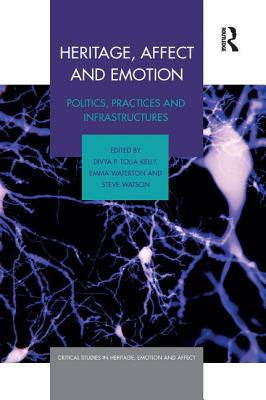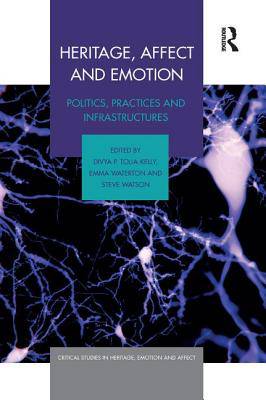
Bedankt voor het vertrouwen het afgelopen jaar! Om jou te bedanken bieden we GRATIS verzending (in België) aan op alles gedurende de hele maand januari.
- Afhalen na 1 uur in een winkel met voorraad
- In januari gratis thuislevering in België
- Ruim aanbod met 7 miljoen producten
Bedankt voor het vertrouwen het afgelopen jaar! Om jou te bedanken bieden we GRATIS verzending (in België) aan op alles gedurende de hele maand januari.
- Afhalen na 1 uur in een winkel met voorraad
- In januari gratis thuislevering in België
- Ruim aanbod met 7 miljoen producten
Zoeken
Heritage, Affect and Emotion
Politics, Practices and Infrastructures
€ 102,45
+ 204 punten
Omschrijving
Heritage and its economies are driven by affective politics and consolidated through emotions such as pride, awe, joy and pain. In the humanities and social sciences, there is a widespread acknowledgement of the limits not only of language and subjectivity, but also of visuality and representation. Social scientists, particularly within cultural geography and cultural studies, have recently attempted to define and understand that which is more-than-representational, through the development of theories of affect, assemblage, post-humanism and actor network theory, to name a few. While there have been some recent attempts to draw these lines of thinking more forcefully into the field of heritage studies, this book focuses for the first time on relating heritage with the politics of affect. The volume argues that our engagements with heritage are almost entirely figured through the politics of affective registers such as pain, loss, joy, nostalgia, pleasure, belonging or anger. It brings together a number of contributions that collectively - and with critical acuity - question how researchers working in the field of heritage might begin to discover and describe affective experiences, especially those that are shaped and expressed in moments and spaces that can be, at times, intensely personal, intimately shared and ultimately social. It explores current theoretical advances that enable heritage to be affected, released from conventional understandings of both 'heritage-as-objects' and 'objects-as-representations' by opening it up to a range of new meanings, emergent and formed in moments of encounter. Whilst representational understandings of heritage are by no means made redundant through this agenda, they are destabilized and can thus be judged anew in light of these developments. Each chapter offers a novel and provocative contribution, provided by an interdisciplinary team of researchers who are thinking theoretically about affect through landscapes, practices of commemoration, visitor experience, site interpretation and other heritage work.
Specificaties
Betrokkenen
- Uitgeverij:
Inhoud
- Aantal bladzijden:
- 320
- Taal:
- Engels
- Reeks:
Eigenschappen
- Productcode (EAN):
- 9781138547346
- Verschijningsdatum:
- 6/02/2018
- Uitvoering:
- Paperback
- Formaat:
- Trade paperback (VS)
- Afmetingen:
- 156 mm x 234 mm
- Gewicht:
- 449 g

Alleen bij Standaard Boekhandel
+ 204 punten op je klantenkaart van Standaard Boekhandel
Beoordelingen
We publiceren alleen reviews die voldoen aan de voorwaarden voor reviews. Bekijk onze voorwaarden voor reviews.








